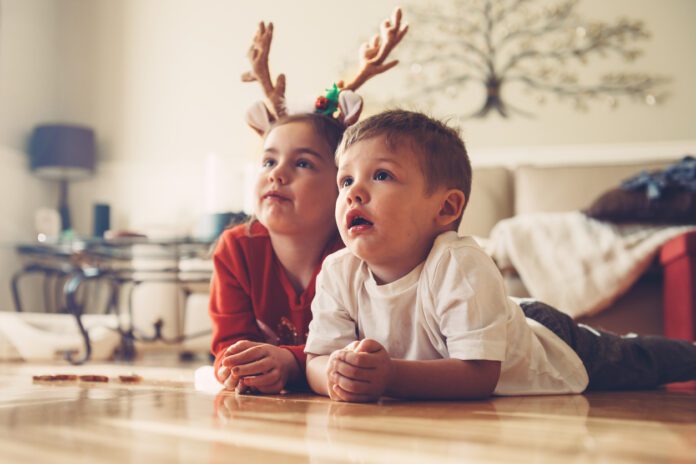How to flip the switch on screen time
Don’t feel bad about your children spending hours watching their favourite films over the Christmas holidays. Former primary school teacher Becky Cranham of education resource experts PlanBee shows how canny parents can make it an educational experience
Many parents fret about the amount of screen time their children are getting, but it’s not always the enemy; there are lots of ways you can give your child valuable learning opportunities whilst plonking them in front of a movie while you get on with your Christmas preparations.
Here’s our list of top suggestions for educational activities you can engage your children in while watching some of the most loved children’s movie hits.
The Lion King
Whether it’s the new live-action version or the original animation, The Lion King is a great film for teaching children about animals and the natural world:
- Ask them to keep a tally of the different animals they see as they watch the film. How many can they record? What different animals are there?
- Once they have their tally chart, or they’ve noted which animals they spotted in the film, challenge them to classify the animals into groups. How many different ways can you group them together? What criteria will you use?
- You could also ask older children to convert the information they have gathered in their tally charts into a graph.
- Extend their learning by asking them to create a report about one of the animals they’ve seen in the film. Challenge them to describe the animal’s appearance, habitat, diet and features.
FREE: The Lion King Activity Sheets
Toy Story
Toys are a great jumping-off point for children to explore different materials and their properties, and any of the Toy Story movies can be used for the activities below:
- Ask children to note down what materials each toy in the film is made from. Which toys are made from plastic, metal, fabric, wool, wood, paper? Are there any other materials used to make toys?
- Challenge them then to go and explore their own toys. Which are made from fabric, like Woody? Which have metal in them, like Slinky? Can they group their toys according to the material they are made from?
- Extend their learning by asking them to pick three of their own toys, each made from a different material, and ask them to write a story about what the toys might get up to when humans leave the room.
FREE: Toy Story Activity Sheets
Harry Potter
If your child is a Potterhead, these films provide a wealth of learning opportunities, almost too many to list! Here are our favourites:
- Ask children to write down all the spells they come across during the film, and what each spell does. At the end of the film, challenge them to make a spellbook (complete with a contents page classifying the spells into groups, instructions and diagrams on wand movement, pronunciation tips, etc.) cataloguing the various spells used in the wizarding world. Children could also research the etymology of the spells, such as ‘accio’ meaning ‘I summon’ in Latin!
- Children could do a similar activity surrounding the mythical beasts found in the films, such as the hippogriff, Buckbeak. As they watch the film, they should make notes about the name of each creature, their physical characteristics, behaviour and any other interesting facts. Once they’ve gathered the information, they can make their own information book or presentation about mythical creatures.
FREE: Harry Potter Activity Sheets
Mary Poppins
Whether the original or updated version, there are lots of learning opportunities in Mary Poppins:
- Ask children, ‘How do you know Mary Poppins took place in the past?’ This enquiry question will lead them to look more closely at the clothes the characters wear, the activities they do, the transport that’s used and the buildings they can see. Ask them to make a note of any clues they see throughout the film.
- When the film is finished, explain that the film is set in 1910 in London during the Edwardian era. Challenge them to make a poster showing how London (or the UK in general) was different in Edwardian times to how it is today.
- Extend their learning by asking them to find out more about Edwardian times. Older children may wish to focus on the Suffragette movement, which plays a big part in the life of Mrs Banks.
FREE: Mary Poppins Activity Sheets
Willy Wonka and the Chocolate Factory
Chocolate, catchy songs, a bonkers entrepreneur… what’s not to love?! There are tons of fun activities you can engage your children with as they watch this moreish movie:
- Ask children to note down every single piece of confectionary they come across during the film. They should note its name and a description. When the film is finished, challenge children to create a shopping catalogue for Willy Wonka’s factory. The catalogue should include the details they have listed, a picture of each item, the price and a description that encourages customers to want to buy each piece.
- Extend the activity above by giving children a certain amount of money and asking them to choose which chocolate bars or sweets they would buy. How much would your selection cost altogether? How much change would you get? They could even set up their own Willy Wonka Chocolate Shop so the whole family can role play buying and eating all the delicious treats!
FREE: Willy Wonka Activity Sheets
Frozen
Use this popular favourite to explore the seasons with your child. With such dramatic differences between summer and winter portrayed, it’s a great way to get children thinking about the seasons and how they affect people and animals:
- Ask children to create a list of words that describe both summer and winter as they watch the film. Encourage them to list as many things as they can, including what people are wearing, colours seen, people and animal’s reactions, what activities they are doing, etc. They could create a mind map or simply list their ideas.
- Once they have finished compiling their lists, challenge them to write an acrostic poem to portray both summer and winter.
- Extend their learning by challenging them to explore how ice behaves. You could challenge them to, for example, investigate what materials they can wrap a cup of ice cubes in to keep it frozen for the longest. Would newspaper or fabric wrapped around the cup keep the ice coolest for longest? Or bubble wrap or tin foil? Challenge them to record their results in charts and graphs.
FREE: Frozen Activity Sheets
The Secret Life of Pets (1 and 2)
These pet films are a really fun way to get your children to be more familiar with different types of pets and their behaviours:
- As they watch the film, ask them to record the name of each pet they come across, as well as what animal they are, what they like to eat, appearance, size, any other information they can note. Older children could also explore the breed of each cat, dog, bird, etc.
- Once the film has finished, if there are any gaps in their information (such as if they didn’t learn what the budgie eats), challenge them to research this independently to complete their information. They can then create a booklet of pets and how to care for them.
FREE: Secret Life of Pets Activity Sheets
Activities for ANY Film
If there’s a particular film being played on repeat in your house, or you just want some activities for any TV or film time, set one of these fun challenges to give a new dimension to their watching habits:
- Turn the sound off and challenge your child to describe what is happening in the film. Ask children to imagine that they are helping a blind person experience the film, so they need to use as much detail as possible for each scene. You may wish to play children a few short scenes using Audio Description to get them started.
- Once the film has finished, challenge children to retell the story in their own words. There are lots of ways they could do this: as a cartoon strip; as a digital book; as a written recount; as a series of drawings; or as a storyboard.
- Challenge children to write a review of the film. How many stars out of five would you give it? What was the best bit? Which characters were in the movie? Who was your favourite character? Alternatively, they could record a vlog review giving their opinion to share online with friends and family.

| [donate]
| Help keep news FREE for our readersSupporting your local community newspaper/online news outlet is crucial now more than ever. If you believe in independent journalism,then consider making a valuable contribution by making a one-time or monthly donation. We operate in rural areas where providing unbiased news can be challenging. |


















